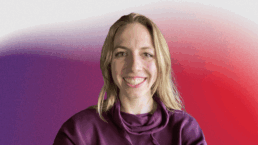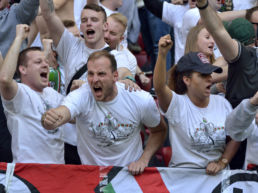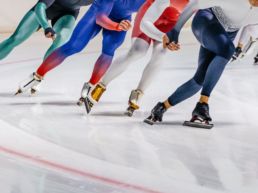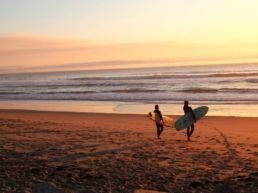How one runner-researcher is using lived experience, deep curiosity and a refusal to accept “we don’t know” to transform the future of female athlete health
Where the questions began
Melissa Lodge didn’t grow up thinking she’d become a researcher. Let alone one breaking ground in a field that has long left female athletes in the margins.
‘I always knew I wanted to help people and thought I would go into healthcare,’ she says. ‘But through my experiences as a female athlete and clinical treatment throughout injuries, I learned even the physicians treating me didn’t have all the answers.’
That gap between what female athletes experience and what professionals are trained to see became a calling. Melissa found herself pulled into research with a clear focus: to understand what is happening inside the female athlete body and why it so often goes unrecognised or unsupported.
I learned even the physicians treating me didn’t have all the answers.
A career rooted in curiosity
Now a PhD candidate in Interdisciplinary Health Sciences, Melissa’s work focuses on Relative Energy Deficiency in Sport (REDs), a condition that affects health, performance and long-term wellbeing in athletes experiencing low energy availability. It is a topic that still doesn’t get the attention it deserves, despite its prevalence.
‘These valuable research questions are often overlooked and undervalued,’ she explains. ‘Getting support for female athletes from their national governing bodies, coaches or other support staff members has proven to be incredibly challenging when the seriousness of health-related conditions is not prioritised.’
Her research is academic but also advocacy. Each dataset, each paper, each presentation is part of a bigger mission: to make sure girls and women in sport are seen, heard and protected.
Life on the track and in the lab
Melissa’s work doesn’t end with research. She is also an elite runner who has competed at the USATF Indoor Championships. That lived duality of being both the subject and the scientist is part of what makes her perspective so vital.
‘I was always fascinated in female athlete physiology and women’s health, and sports nutrition in particular,’ she says. ‘I’ve had great male mentors in my journey (I’m lucky!) but I’ve also worked on female-dominated teams, and it is a really invigorating and inspiring environment.’
Her Instagram account, @FED_collaborative, acts as a bridge between the lab and the locker room. It translates science into insights that athletes, coaches and families can use today. For Melissa, it is not enough to discover the truth. It has to be shared, understood and acted on.
Pushing through the silences
Despite her expertise and achievements, Melissa is no stranger to resistance. Especially when the questions she is asking challenge outdated norms or systems slow to change.
‘There are fewer women in leadership roles, meaning fewer mentors or allies in senior roles, which can feel like a hindrance in my career path,’ she shares. ‘On the other hand, personal connections and advocacy really matter, so I’ve made a concerted effort to put myself forward.’
That effort looks like presenting at international conferences. Mentoring emerging researchers. Publishing. Applying for leadership roles. And showing up, again and again, for the athletes who can’t yet advocate for themselves.
And most of all?
Don’t wait for perfect. You don’t need to have every qualification or tick every box to try your best and learn as you go.
A culture beginning to shift
Still, Melissa is hopeful. She sees the momentum building in policy, in visibility and in the growing demand for gender-specific research.
‘The growth of women’s sports is really, really exciting!’ she says. ‘Female athletes are calling for information for themselves and WANT answers that our research can provide.’
She points to campaigns like Everyone Watches Women’s Sports and prize initiatives like ATHLOS as signs of changing tides. And she believes education, real and rigorous and relevant, is the key to unlocking the next phase.
Imagining a future that works for women
When asked what women’s sport might look like ten years from now, Melissa doesn’t hesitate.
‘More girls in sports, less early sport specialisation, diverse female athlete role models, continued opportunities for girls to go to college, more investment, more funding, more women in sports succeeding.’
Her vision is about reworking the system from the inside. That means policy reform, institutional change and building bridges between research, industry and community.
‘As someone training to be both a researcher and a practitioner, I believe we need to create more visible, supported and valued pathways for women in every area of sport. We must invest in the future of women’s sport from the inside, out. Change is possible and it starts with both action and advocacy.’
For the girls coming up
Melissa doesn’t see herself as a gatekeeper. She is here to open doors and keep them open.
Her advice for young women breaking into sport or research?
‘Say “YES”. Back yourself. Speak up, ask questions, challenge assumptions and trust that you belong in those spaces. Keep going. Growth comes from stretching your comfort zone.’
And most of all?
‘Don’t wait for perfect. You don’t need to have every qualification or tick every box to try your best and learn as you go.’
What legacy looks like
For Melissa, this work isn’t just about publishing papers or collecting accolades. It is about creating the conditions where female athletes can thrive, fully and unapologetically.
‘Hopefully, my work can inspire other girls and women in sport,’ she says.
Because in a field that too often says “we don’t know”, Melissa is one of the voices saying: let’s find out.
Women like Melissa are the voices changing the game – on and off the field.
Follow her socials below and stay connected with She Moves The Game as we spotlight more trailblazing women in sport.
Want to share your story or nominate someone doing amazing work in women’s sport?
Jess Reus
I am a food-loving, dog-appreciating, hockey player.
My most memorable sporting moment is…
Full on face planting on the Spine Ramp at FISE Montpellier in front of a crowd of 6,000 people and a load of professional Skateboarders...
I am happiest when …
I have food in my mouth.
The sports person that best represents me is …
Kate Richardson-Walsh.
The three things at the top of my bucket list are …
1. Travel around China and Japan
2. Meet Trixie Mattel
3. Learn a second language
A quote I live my life by is …
“They say I'm the Hottest MC in the Game. If you label me that, I will live up to it. Trust me.” – Lil Wayne.





